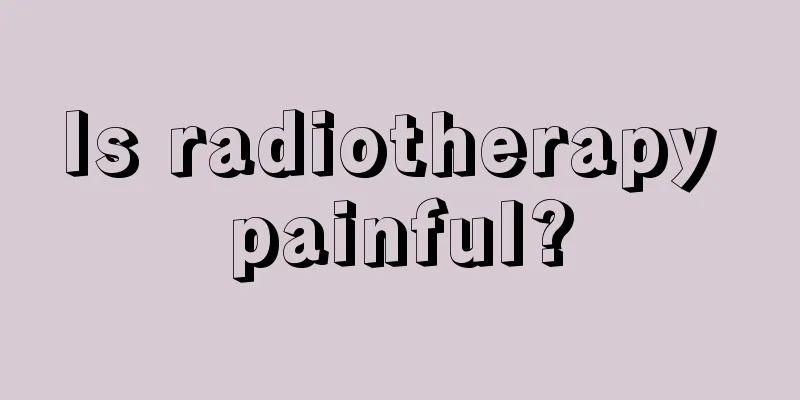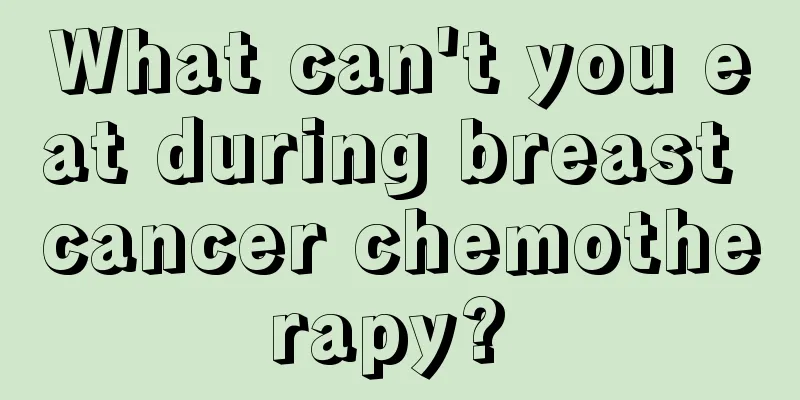Is radiotherapy painful?

|
Radiation therapy is a treatment method used for cancer patients. Generally speaking, if a person's physical condition makes surgery impossible, radiotherapy can be used to relieve and treat tumor symptoms. One of the benefits of radiotherapy is that it is painless, but there will be some discomfort. In addition, radiotherapy also has certain side effects. Below we will introduce you to the relevant knowledge of radiotherapy in detail! 1. What is radiotherapy? Radiotherapy is an anti-tumor method that uses radiation to irradiate tumors to inhibit or kill tumor cells. Radiotherapy, together with surgery and chemotherapy, is known as the "three horses" in the fight against tumors. Radiotherapy is one of the main local means of combating tumors. Almost any tumor in any part of the body can be treated with radiotherapy. According to statistics, about 70% of cancer patients need to receive radiotherapy at some stage during the course of the disease. 2. Is radiotherapy painful? Radiation therapy is also known as radiotherapy. This is a method in which rays of specific frequency or wavelength penetrate a certain depth from the body surface to reach the lesion, and use the high energy carried by the rays to "heat" the lesion, causing the malignant tumor or residual malignant cells to die and calcify. Patients do not feel pain during radiotherapy and can relax. It’s just that the side effects after radiotherapy make patients feel uncomfortable for a period of time, and the degree of discomfort varies depending on the patient’s tolerance. Generally, there will be symptoms such as nausea, fatigue, loss of appetite, and hair loss. During this period, eating more watermelon and taking some drugs with whitening effects as prescribed by the doctor are good measures to reduce the reaction to radiotherapy! 3. Side effects of radiotherapy Systemic reaction: manifested as a series of functional disorders and imbalances, such as lack of energy, decreased appetite, physical weakness, fatigue, nausea and vomiting, bloating after eating, etc. Mild cases may not require treatment, while severe cases should be treated in time, combined with traditional Chinese medicine to improve the body's immunity. Local reactions: a. Skin: Dry skin is characterized by itching, pigmentation and peeling, which can produce permanent light brown spots. Moist skin manifests as eczema and blisters at the irradiated site. In severe cases, it may cause erosion and ulceration. If there is ulceration, MEBO moist burn ointment can be applied to the site and radiotherapy should be suspended. b. Mucosal reactions: Mild: Symptoms include redness, swelling, erythema, congestion of the oral mucosa, and decreased secretions. Dry mouth, slight pain, and slightly less food intake. Moderate: Oropharyngeal area is obviously congested and edematous, with spotted white film and ulcers, obvious pain, and difficulty eating. Severe: The oral mucosa is extremely congested, eroded, and bleeding, fused into a white film, the ulcers worsen, and there is purulent secretion, severe pain, inability to eat, and occasional fever. During this period, radiotherapy needs to be suspended and oral care should be strengthened. |
<<: Can the spots on the bridge of the nose be removed
>>: Can I swim if I have urticaria
Recommend
Can brain cancer be treated in its early stages?
Can brain cancer be treated in its early stages? ...
Relaxing Leg Massage
A relaxing leg massage is very helpful for us to ...
Will not sleeping for one night affect the exam?
A night of sleep deprivation will generally affec...
To detect the disease in time, you must first understand the symptoms of liver cancer
Generally speaking, the symptoms of liver cancer ...
Why do you keep farting when you are constipated
Many people have experienced constipation in life...
Are there any side effects of spinal anesthesia?
It is very common to use anesthesia during surger...
Is swimming good for rhinitis?
Swimming is a very good aerobic exercise. It can ...
Early symptoms of colorectal cancer
The early symptoms of colorectal cancer may not b...
Is sandalwood mosquito coil poisonous?
I believe that for many friends, in the hot summe...
What are the symptoms of brittle bone disease
Many people have eaten cartilage, whether it is p...
The effect of skin care cream
Nowadays, the environment in which people live is...
What are the best and fastest ways to get rid of acne
Acne, blackheads, or pimples are common problems ...
Are Cassia tora and Cassia seed the same? What are their effects?
In real life, Cassia tora and Cassia seed are act...
Is there any nasopharyngeal cancer that does not recur? What is good to eat?
There are more and more patients with nasopharyng...
Can bananas and eggs be eaten together
Bananas and eggs can be eaten together without ca...









